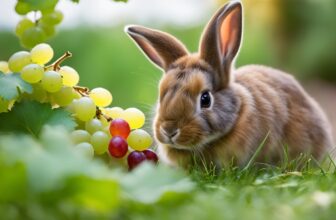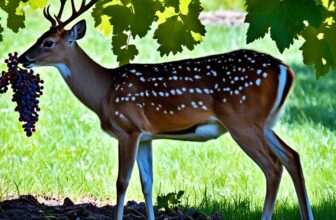Birds Eat Grapes: Feathered Friends’ Fruity Treats
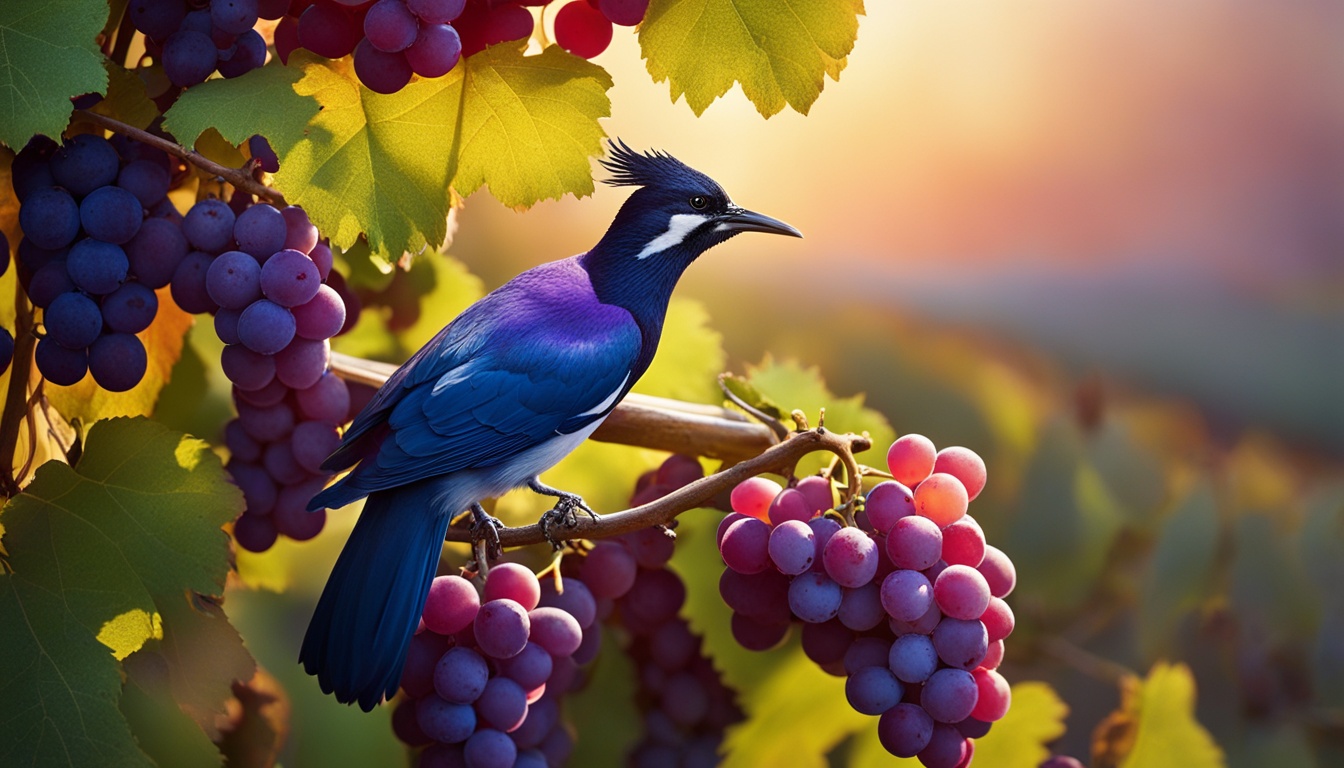
Do our feathered companions actually enjoy grapes as much as we do? Surprisingly, grapes can be a nutritious and delightful snack for many bird species. These juicy, sweet fruits offer a wealth of vitamins, minerals, and hydration that can complement the natural foraging diet of our avian friends.
Grapes, both wild and cultivated, have emerged as a popular choice for backyard bird enthusiasts and wildlife rehabilitators alike. But before indulging our feathered friends, it’s crucial to understand the potential benefits and risks associated with this seemingly innocuous fruit. Join us as we explore the world of grapes and their place in the diverse dietary preferences of our winged companions.
Key Takeaways
- Grapes can be a nutritious snack for many bird species, providing essential vitamins, minerals, and hydration.
- Wild grapes offer vital nutrients and a source of energy for birds, especially during migration periods when they require additional calories.
- Grapes should be fed in moderation due to their high fructose content, which can lead to obesity and vitamin deficiencies if consumed in excess.
- Proper preparation, such as removing seeds and cutting grapes into appropriate sizes, is crucial for ensuring bird safety when offering this fruit.
- Consulting a veterinarian or expert is advised when introducing new foods to a bird’s diet to ensure their health and well-being.
Introducing Raisins: A Sweet Treat for Our Feathered Companions
Raisins, the dried version of grapes, can also be a safe and nutritious treat for birds. These bite-sized morsels contain natural sugars, fiber, and various vitamins and minerals that can provide energy and promote overall health in our feathered friends. Many bird species, including robins, bluebirds, finches, sparrows, and even larger birds like crows or jays, have been observed enjoying the sweet taste of raisins.
Exploring the Benefits and Potential Risks of Offering Dried Grapes to Birds
While raisins can be a delightful addition to a bird’s diet, it’s important to introduce them slowly and observe the bird’s reaction. Some birds may have allergies or sensitivities to dried fruits, so it’s crucial to keep an eye out for any adverse effects. Moderation is key when offering raisins, as their high sugar content can lead to obesity or malnutrition in smaller birds if consumed regularly.
| Nutrient | Raisins | Grapes |
|---|---|---|
| Calories | 429 per cup | 104 per cup |
| Carbohydrates | 115g per cup | 27g per cup |
| Fiber | 5.4g per cup | 1.4g per cup |
| Vitamin C | 3.0mg per cup | 27.7mg per cup |
| Potassium | 748mg per cup | 288mg per cup |
As the table shows, raisins contain a higher concentration of calories, carbohydrates, and fiber compared to fresh grapes. However, grapes have more Vitamin C and Potassium. Introducing raisins in moderation can provide birds with a tasty and nutritious supplement to their diet, but it’s essential to monitor their intake and overall health.
By offering raisins as an occasional treat, bird owners can provide their feathered companions with a bird-friendly snack that can be a part of a balanced and varied diet. As with any dietary change, it’s always best to consult with a veterinarian or avian specialist to ensure the safety and well-being of your backyard bird friends.
The Nutritional Value of Grapes for Birds
Grapes, both wild and cultivated, offer a range of nutritional benefits for our feathered friends. These juicy fruits are rich in essential vitamins, minerals, and natural sugars that can fuel the energy needs of birds. Understanding the grape’s nutritional profile is key to appreciating its importance in a bird’s diet.
Vitamins, Minerals, and Natural Sugars That Fuel Our Winged Friends
Grapes are an excellent source of Vitamin C, which is crucial for maintaining healthy blood and supporting the immune system. They also contain important minerals like iron and potassium, which aid in muscle function, heart health, and overall bodily processes. The natural sugars in grapes provide a quick energy boost, particularly valuable during migration periods or colder months when birds need extra fuel for flight and warmth.
Incorporating grapes into a bird’s diet can help supplement their regular foraging diet and provide a diverse range of essential nutrients. Wild grapes are particularly beneficial for birds during migration periods, offering essential nutrients and calories due to their high sugar content.
| Nutrient | Importance for Birds |
|---|---|
| Vitamin C | Supports immune system and healthy blood |
| Iron | Aids in muscle function and oxygen transport |
| Potassium | Regulates heart function and muscle contractions |
| Natural Sugars | Provides quick energy for flight and warmth |
By understanding the grape nutrition for birds, their vitamins and minerals, and the energy-boosting properties of grapes, we can appreciate the importance of grape consumption for birds. Offering this natural and nutritious treat can help support the overall health and well-being of our feathered friends.
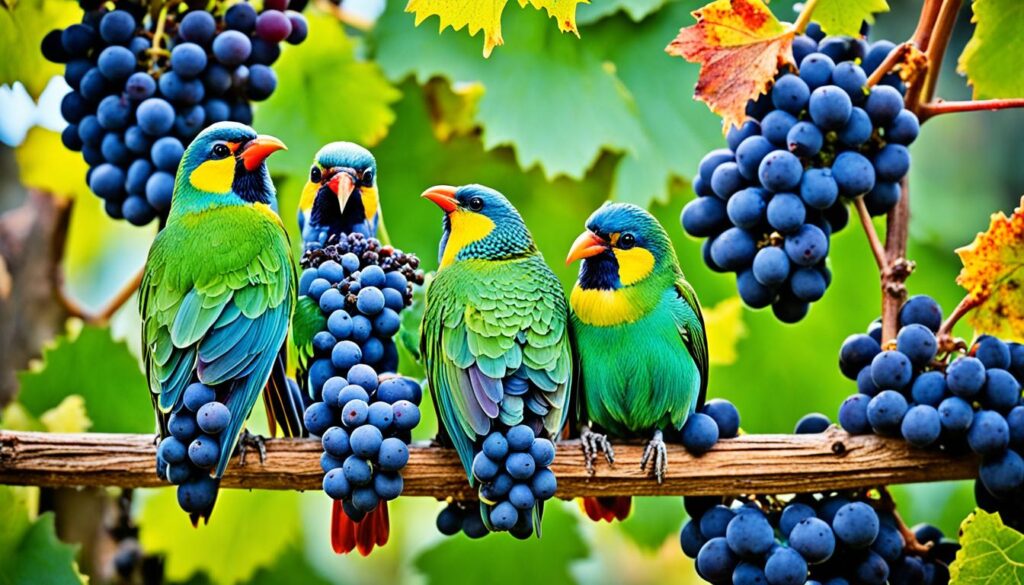
Which Bird Species Enjoy Grapes?
A diverse array of bird species are drawn to the sweet taste and nutritional value of grapes. From the vibrant robins and jays to the industrious woodpeckers, these feathered foragers can often be spotted pecking away at grapes, whether in sprawling vineyards, lush backyard gardens, or well-stocked bird feeders.
Beyond the classic favorites, other avian enthusiasts of the grape include the striking cardinals and the elegant waxwings. These birds’ affinity for the grape’s natural sweetness provides valuable insights into the dietary preferences of our winged friends. By understanding which species are attracted to this juicy fruit, we can better cater to their needs and encourage a thriving, diverse backyard ecosystem.
| Bird Species | Attraction to Grapes |
|---|---|
| Robins | Known to frequently forage for grapes, both in the wild and in gardens. |
| Jays | These bold birds are often observed feasting on grapes, whether ripe or unripe. |
| Woodpeckers | Some species, like the acorn woodpecker, have been documented enjoying grapes. |
| Cardinals | The striking red plumage of cardinals can be seen amongst the grape vines, as they indulge in the sweet fruit. |
| Waxwings | These elegant birds, with their distinctive crests, are particularly drawn to wild grapes growing in nature. |
By understanding the birds that find grapes irresistible, we can create inviting backyard environments that cater to their preferences. Whether it’s planting native grape varieties or strategically placing grape-filled feeders, these steps can help attract a diverse array of our feathered friends and foster a harmonious coexistence between birds and the grapes they love.
Safely Serving Grapes to Wild Birds
When it comes to offering grapes as a treat for our feathered friends, preparation and moderation are key. To ensure the safety and enjoyment of wild birds, it’s important to take a few simple steps.
Preparation Tips for Serving Grapes
- Cut the grapes in half to make them easier for birds to consume and prevent any choking hazards, especially for smaller species.
- Ensure the grapes are free from pesticides or other harmful chemicals, as these can be detrimental to the health of wild birds. Opt for organic grapes whenever possible.
- Consider offering the grapes on a clean, elevated platform or bird feeder to make them more accessible and reduce the risk of contamination from the ground.
Moderation Guidelines for Grape Treats
While grapes can be a nutritious and tasty treat for birds, it’s crucial to remember that they should be offered in moderation as a supplement, not a replacement for a bird’s primary diet. Stick to the following guidelines to ensure your feathered friends enjoy their grape treats safely:
- Provide no more than 1-2 halved grapes per bird, a couple of times a week.
- Avoid feeding grapes on consecutive days, as the high sugar and juice content can potentially cause digestive issues or obesity.
- If you’re growing grapes in your yard, be mindful of any treatments used on the vines to ensure the safety of the birds visiting your garden.
By following these simple preparation and moderation tips, you can safely offer grapes as a delightful and nutritious treat for the wild birds in your backyard. Remember, a balanced diet with a variety of natural foods is essential for the overall health and well-being of our feathered friends.
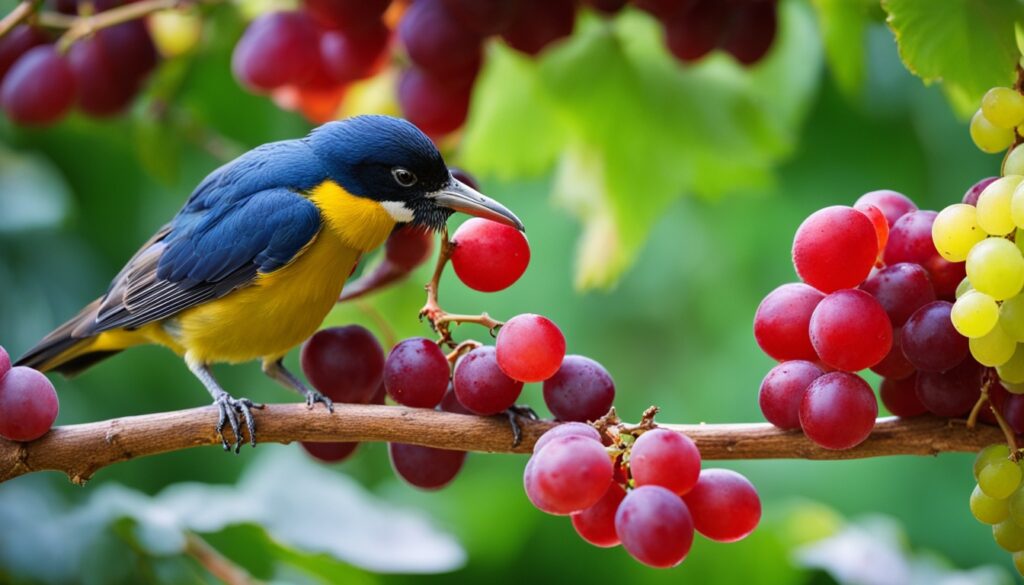
Do Birds Eat Grapes? A Closer Look at the Dietary Preferences of Our Feathered Friends
Birds, much like their human counterparts, can enjoy a variety of fruits as part of their diet, including grapes. Many species, such as robins, jays, and waxwings, are naturally drawn to the sweet taste and nutritional benefits of grapes, both wild and cultivated. Incorporating grapes into a bird’s diet can provide a supplemental source of essential vitamins, minerals, and natural sugars that fuel their active lifestyles.
However, it’s important to introduce grapes and other fruits in moderation, as birds have unique digestive systems that may not thrive on an overabundance of sugary treats. The high sugar content in grapes can lead to feeding-related health problems like obesity, showcasing the need for dietary balance.
Understanding Bird Food Preferences
While grapes may be a favorite for some bird species, it’s essential to recognize that different birds have varying dietary needs and preferences. Some birds are primarily seed eaters, while others prefer insects or nectar. Providing a diverse range of foods in bird feeders, such as sunflower seeds, millet, suet, and mealworms, can help cater to the needs of a wider variety of bird species in your backyard.
Certain foods, like avocados and chocolate, are actually toxic to birds and should never be offered. Processed sugary foods can also be harmful to a bird’s health and should be avoided. Responsible backyard bird feeding involves understanding the specific dietary requirements and preferences of the feathered friends you aim to attract.
Safely Serving Grapes to Birds
If you do decide to offer grapes to your feathered visitors, it’s crucial to do so safely. Grapes should be washed thoroughly and cut into small, bite-sized pieces to prevent the risk of choking, especially for smaller birds. Additionally, it’s essential to remove the grape seeds, as they can pose a potential hazard if ingested.
Another important consideration is the potential presence of pesticide residues on the grape skins. Pesticide contamination can provoke health complications in birds, including changes in eating habits, weight loss, and potentially fatal poisonings. Opting for organic or thoroughly washed grapes can help mitigate this concern.
By understanding the dietary preferences and safety considerations for offering grapes to birds, you can enhance the health and well-being of the feathered friends that visit your backyard. Striking the right balance between providing a variety of nutritious foods and exercising moderation with sugary treats can create a welcoming and sustainable environment for our avian companions.
The Potential Risks: Precautions for Feeding Grapes to Birds
While grapes can be a nutritious treat for birds, it’s crucial to be aware of the potential risks and take necessary precautions. Commercially grown grapes may harbor pesticide residues that can be harmful to birds, so it’s best to opt for organic options whenever possible. Additionally, the high sugar content in grapes can lead to obesity or malnutrition in smaller bird species if consumed in excess. It’s important to offer grapes in moderation and as part of a balanced diet.
Addressing the Grape and Raisin Toxicity Concern for Dogs
Another important consideration is the presence of dogs in the area where birds are fed. Grapes and raisins are extremely toxic to dogs and can cause sudden kidney failure, even in small amounts. Keeping these fruits completely out of reach of canine companions is essential for their safety.
According to the American Society for the Prevention of Cruelty to Animals (ASPCA), grapes and raisins are considered toxic to dogs, and even small amounts can lead to kidney failure. It’s important to ensure that any bird feeders or food sources are positioned in a way that prevents curious dogs from accessing them.
- Grapes and raisins are highly toxic to dogs and can cause sudden kidney failure.
- Even small amounts of these fruits can be dangerous for dogs, so they must be kept out of reach.
- When setting up bird feeders or food sources, consider the potential presence of dogs and take steps to ensure the safety of both your feathered and furry friends.
By being mindful of the potential risks and taking the necessary precautions, you can safely and responsibly enjoy the joy of feeding grapes to your backyard birds while also protecting the well-being of any canine companions in the area.
Conclusion
In our exploration of the world where birds meet grapes, we’ve uncovered a delightful and mutually beneficial relationship. Grapes, both fresh and dried, offer a nutritious and enjoyable treat for a variety of bird species, providing them with essential vitamins, minerals, and natural sugars that can supplement their regular diet and give them a quick energy boost, especially during migration or colder months.
As we consider the key takeaways on grape feeding for birds, it’s clear that moderation and precaution are crucial. By cutting grapes in half, using organic options, and serving them in moderation, we can ensure that our feathered friends can safely indulge in this sweet delight. Additionally, it’s imperative to keep a watchful eye and prevent dogs from accessing grapes or raisins, as these can be highly toxic to canines.
In the realm of backyard bird care and nutrition, understanding the dietary preferences and nutritional needs of our winged visitors is the foundation for providing them with a diverse and healthy menu of treats, including the delightful grape. By embracing this knowledge, we can foster a thriving and harmonious coexistence between birds and their favorite fruity snacks, creating a backyard sanctuary where the joy of feeding our feathered friends is matched only by their sheer delight in savoring the sweet rewards.



